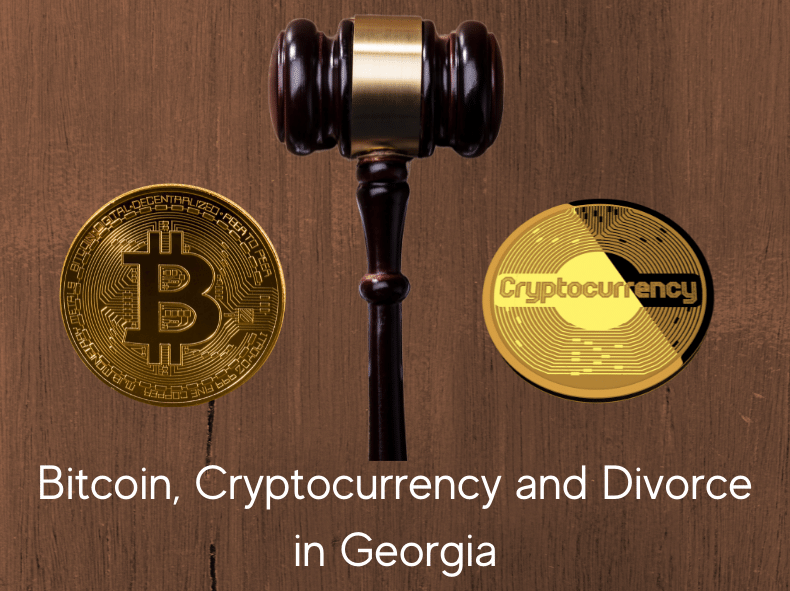
Divorce in today’s tech-driven world comes with an important new consideration: assets are no longer just physical. Aside from the house, car, and bank accounts, cryptocurrency has become a valuable property that as many as 20 million Americans now own.
“Crypto” is stored and traded digitally in highly private conditions. This gives rise to concerns that cryptocurrency could be used to hide a spouse’s assets so that they could not be included in a divorce.
What is cryptocurrency or Bitcoin, and how does it factor in a Georgia divorce? If you are divorcing and have cryptocurrency concerns, talk to a divorce attorney who is up-to-date in asset and property laws.
In the most basic sense, cryptocurrency is a form of digital money. However, it is not quite the same as storing your US dollars in a credit card account. Crypto is like its own currency, unregulated by any government or financial institution. What runs it is a highly secure network of computers called a blockchain, which acts as a ledger for all crypto participants.
Units of cryptocurrency are commonly called tokens or coins. Individuals can use their tokens to make online purchases, or trade them like how real-world money is traded in the stock market.
The very first cryptocurrency to exist, and still one of the most popular today, is Bitcoin. As of October 14, 2021, one unit of Bitcoin equals USD 57,119.60. There are many other cryptocurrencies that are traded similarly such as Ethereum, Binance Coin, Cardano, Tether, XRP, Solana, Polkadot, Dogecoin, Chainlink, Litecoin, Avalanche as well as NFTs (non fungible tokens) such as CrypoPunks, Beeples, Bored Apes, Cool Cats and more.
One significant feature of cryptocurrencies is enhanced security. The blockchain is viewable by the public, but it is highly encrypted (digitally protected), and does not get interference from governments or central banks.
This makes it difficult to trace crypto transactions. In fact, even if you can access the blockchain, you would not be able to find the owner of any transaction unless you have that owner’s private key.
In terms of taxation, Bitcoin and other cryptocurrencies are considered property in the US, similar to a stock. The Internal Revenue Service published a notice (IRS Bulletin 2014-21) specifically stating: “For federal tax purposes, virtual currency is treated as property.”
Thus, for divorce matters related to taxes - such as alimony and child support - cryptocurrency investments and transactions may factor in the calculation.
Bitcoin and other types of crypto could be divided upon divorce if 1) the crypto qualifies as marital property (as opposed to separate property), and 2) there is a way for both spouses to receive their share of cryptocurrency.
In many cases, however, it is challenging to transfer cryptocurrency from one spouse to another. A common scenario is that the other spouse does not participate in cryptocurrency or is not familiar with how it works.
In this case, the couple will need to work with a financial professional to find ways to distribute the crypto. One option is to ‘convert’ the crypto into US dollars. (This is what the IRS does for tax purposes.)
Bitcoin and other cryptocurrencies may be treated like any other property during divorce property division.
First, we determine whether the crypto is separate property or marital property. Separate properties are those you acquired before marriage or received as gifts. They remain solely yours upon divorce. Meanwhile, marital property is any asset acquired during marriage. This is divided between you and your spouse upon divorce.
If you invested in cryptocurrency after getting married, it does not matter whether you are the only one maintaining the account -- your soon-to-be former spouse may still be entitled to a share of it.
If your crypto investment was made before marriage, that investment is your sole separate property. However, there is still a possibility that it would be commingled or transformed into marital property.
One example is if your investment appreciated after you got married. Cryptocurrencies are known for volatile changes in value, and sometimes, the dollar value of a crypto token can be much higher (or lower) than when you originally bought it. If that growth happened during your marriage, your spouse may be able to argue that they are entitled to a share of the appreciation.
If you are unsure about cryptocurrency distribution during a divorce, discuss it with a knowledgeable attorney.
If you suspect that your spouse is hiding assets via cryptocurrency, you’ll want to consult with an experienced divorce lawyer.
Look out for signs that may indicate asset concealment:
Your divorce attorney will either have the familiarity and resources to uncover hidden crypto assets or may work in conjunction with a forensic accountant. Tracing any concealed crypto requires not just an understanding of the technology but also insider knowledge of asset concealment methods.
Attorney Sharon Jackson has proficiently handled many divorce cases in Georgia involving complex money issues such as asset concealment, property division, child support, spousal support, and taxes. She stays abreast with the ever-changing financial landscape affecting divorcing spouses. With her network of financial experts, Ms. Jackson can help you ensure that your financial rights are upheld throughout your divorce.
Call us today at (678) 909-4100 or use our online contact form to schedule a consultation.
Attorney Sharon Jackson LLC
175 Langley Drive, Suite A1
Lawrenceville, GA 30046
Phone: (678) 909-4100